#Building Code Violations Philippines
Explore tagged Tumblr posts
Text
Building Fails Philippines – Part 2
Photo by Sami Aksu This weeks article is called building fails in the Philippines – part 2. As I mentioned in last week’s article, it is not to highlight foolishness but a collection of areas I need to think about when building your home in the Philippines. In most of my articles, I have talked about topics that are the “normal” way of building a home in the Philippines. In my mind, some of…
#Architectural Failures Philippines#Building Code Violations Philippines#Building Collapse Philippines#Building Disasters Philippines#Building Inspections Philippines#Building Regulations Philippines#Building Safety Issues Philippines#Building Safety Philippines#Construction Blunders Philippines#Construction Errors Philippines#Construction Failures Philippines#Construction Mistakes Philippines#Construction Oversights Philippines#Construction Quality Philippines#Engineering Blunders Philippines#Engineering Mistakes Philippines#Engineering Oversights Philippines#Philippines Building Fails#Structural Failures Philippines#Structural Integrity Philippines
0 notes
Text
BEYOND THE WEDDING BELLS: A LESSON FROM CHI MING TSOI

When intimacy is absent, does marriage still hold? The Supreme Court decides.
Marriage is often regarded as a sacred union, built on love, mutual respect, and unwavering commitment. It is a bond that requires both spouses to actively fulfill their marital obligations, ensuring a strong and enduring relationship. But what happens when one partner persistently fails to uphold these fundamental duties? Can a marriage survive without intimacy?
In cases where a marriage becomes one-sided and devoid of essential elements, the law provides legal remedies to dissolve the union. One case that significantly shaped the interpretation of psychological incapacity as grounds for nullity of marriage under Article 36 of the Family Code of the Philippines is Chi Ming Tsoi vs. Court of Appeals (G.R. No. 119190, January 16, 1997).
How It All Began
On May 22, 1988, Chi Ming Tsoi and Gina Lao-Tsoi exchanged vows at the Manila Cathedral, promising to build a life together. Like any new bride, Gina anticipated a loving and fulfilling marital relationship. However, what awaited her was an unexpected and painful reality.
Despite sharing the same bed for nearly ten months, their marriage remained unconsummated—not because of physical incapacity, but due to Chi Ming Tsoi’s inexplicable and absolute refusal to engage in sexual relations. Even their honeymoon in Baguio City failed to change the situation.
Gina, devastated and emotionally distressed, realized that intimacy—an essential aspect of marriage—was being completely denied to her. Feeling trapped in a loveless and unfulfilling union, she turned to the courts and filed a petition for annulment, citing psychological incapacity.
The Regional Trial Court (RTC) of Quezon City ruled in Gina’s favor, declaring the marriage null and void. Chi Ming Tsoi appealed, but the Court of Appeals (CA-G.R. CV No. 42758) upheld the decision. Determined to challenge the verdict, he brought the case before the Supreme Court, which ultimately affirmed the previous rulings and decided against him.
The Supreme Court’s Ruling and Interpretation
In its landmark decision, the Supreme Court ruled that a prolonged and irrational refusal to engage in sexual intercourse constitutes psychological incapacity. The Court clarified that psychological incapacity goes beyond mere unwillingness—it reflects a deep-seated, serious inability to fulfill marital duties.
While no physical defect was proven, Chi Ming Tsoi’s persistent and unjustified refusal to consummate the marriage demonstrated his inability to comprehend and perform spousal obligations. This refusal was not just a temporary or momentary hesitation, but an absolute and continuous disregard for one of marriage’s essential aspects.
The Supreme Court emphasized that Gina’s plea was not just about personal frustration—it was about the very foundation of marriage being compromised. Without physical intimacy, their marriage became an empty shell, lacking a fundamental pillar that binds spouses together. The Court concluded that such behavior amounted to psychological incapacity, rendering the marriage void from the beginning.
Legal Significance of the Case
The ruling in Chi Ming Tsoi vs. Court of Appeals became a landmark precedent in defining psychological incapacity under Article 36 of the Family Code. The case reinforced that psychological incapacity must be more than just a refusal to perform marital duties—it must stem from a deep-rooted personality disorder or inability that renders a spouse incapable of fulfilling their fundamental obligations.
One of the most crucial takeaways from this case is the recognition that sexual intimacy is not just a privilege but a fundamental marital obligation. A persistent and unjustified refusal to engage in marital relations is not simply a personal preference, but a violation of a spouse’s rights. The ruling clarified that when one partner completely denies intimacy without a valid reason, it amounts to psychological incapacity, providing grounds for nullification of the marriage.
This decision also provided legal protection for individuals trapped in marriages where one spouse refuses to perform essential duties, whether emotional, physical, or psychological. By acknowledging psychological incapacity as a valid ground for annulment, the ruling ensures that individuals in one-sided, dysfunctional marriages have legal recourse to escape an unsustainable relationship.
Enduring Relevance in Contemporary Times
As societal perspectives on marriage and mental health continue to evolve, this ruling remains highly relevant. Modern courts now recognize that psychological incapacity is not simply about actions—but about an ingrained inability to meet marital responsibilities.
This case also serves as a deterrent against fraudulent marriages. Some individuals enter into marriage for convenience, such as immigration benefits or financial gain, without genuine commitment. The Supreme Court’s decision reinforces that marriage is not just a contract—it is a solemn vow that demands genuine participation, emotionally, psychologically, and physically.
Furthermore, this case highlights a reality that some people overlook when entering marriage:
Love and commitment are important, but so is fulfilling fundamental marital responsibilities.
A spouse’s deliberate disregard for these obligations can turn a marriage into a one-sided and unsustainable relationship.
While some may argue that love can exist without physical intimacy, the Court’s ruling underscores that marriage is a partnership that involves both emotional and physical connection. When one spouse continuously denies intimacy and disregards the needs of the other, the marriage becomes meaningless—nothing more than a legal bond with no real substance.
Broader Implications and Personal Reflections
The ruling in Chi Ming Tsoi vs. Court of Appeals offers a powerful lesson on the complexities of marriage and legal protections available for those trapped in unfulfilling relationships. It reminds us that marriage is not just a ceremony—it is a lifelong commitment that demands mutual effort.
This case also raises awareness about the seriousness of psychological incapacity as a legal ground for annulment. The ruling ensures that anyone seeking marital nullity on these grounds must prove their spouse’s incapacity with substantial evidence—thus preventing abuse of this legal remedy.
At its core, this ruling empowers individuals who feel helpless in their marriages, giving them a legal pathway to reclaim their lives. It acknowledges that being trapped in a marriage devoid of intimacy, affection, and mutual respect can be emotionally and psychologically damaging. By recognizing psychological incapacity as a legitimate reason for annulment, the law provides justice and relief to those who deserve a second chance at a meaningful partnership.
The case of Chi Ming Tsoi vs. Court of Appeals is more than just a legal milestone—it is a reminder that marriage is more than a contract. It is an active commitment that requires emotional, psychological, and physical engagement from both spouses.
With this ruling, the Supreme Court established clear guidelines on what constitutes psychological incapacity, ensuring that individuals stuck in dysfunctional, one-sided marriages have a legal escape route. The decision continues to guide courts and legal practitioners in handling cases of unconsummated marriages, abandonment, and similar scenarios.
Ultimately, this landmark case teaches us that marriage is a partnership built on love, respect, and shared responsibilities. And when one spouse is incapable of fulfilling these obligations, the law steps in to provide justice, ensuring that marriage remains a union of equals, built on genuine commitment and mutual respect.
1 note
·
View note
Text
#OneNETnewsInvestigates: ASC potentially slap to mislead and partially falsifying 'Free Physical VISA Card' offer of MayBank Phlippines' EzySave+, along the e-wallet partnership of the GCash app [EXCLUSIVE]

TAGUIG, NATIONAL CAPITAL REGION -- MayBank Philippines, in collaboration with e-wallet fintech app 'GCash', has just launched its new digital savings product dubbed 'EzySave+'. The aforesaid newly launched savings shall provide easy and fast readily available banking service to the Filipino consumers through the GCash app. Recently as unexpected however, claims were emerging which somehow classified this new promotion, yet to be misleading and falsified. One of the major confusions has been that of being eligible to have a free physical VISA debit card.
'EzySave+' is a digital savings account, where you can open one directly within the GCash smartphone app, an e-wallet fintech giant from Globe Fintech Innovations Inc. (GFIi), which is owned and wholly-operated subsidairy of G-Xchange. It offers several benefits, including no maintaining balance or annual fee, and free ATM withdrawal via Bancnet-powered ATM (automated teller machine) of any bank in the Philippines. Apart from that, savings with at least PHP0.01 cent earns an interest, with free life insurance coverage of up to PHP1M (or U$D17,108), regardless of personal accident, life and critical illnesses.
OneNETnews can now exclusively reveal via mobile phone patch last Friday afternoon (November 8th, 2024 -- Dumaguete local time) that the free physical VISA debit card is available for users who maintain a minimum savings deposit of PHP10,000 (or U$D172). Below this said amount, the request of a physical VISA debit card will be denied for the meantime, right after you open your very first 'EzySave+' account. This also raised fears on the part of false and misleading advertisement by the Ad Standards Council (ASC).
In our thorough investigation, it proved that it is valid that free VISA debit card issuance with a minimum deposit amount of PHP10,000, in which the basis of online or physical application. The stated requirement is clearly indicated on the website of MayBank and the EzySave+'s terms and conditions. Thus, one can say that there is a partially valid claim of deceptive, false and misleading advertisement, because the standards for qualification were not specified in the first advertisement. The bank advertiser of MayBank belongs in a probable first offense violation of PHP100,000; based from the Codes and Standards rules from the ASC.
For users, who have at least the minimum deposit requirement and are willing to take the risk, you can legally request an applicable free VISA debit card over the phone or in-person at any MayBank branch. This includes branches in Bacolod City, Negros Occidental; where users can easily get their debit cards. If you're in Dumaguete branch office at MayBank, it was permanently closed during the Coronavirus Disease-19 (CoViD-19) pandemic and replaced with the newly-opened 'Watsons Pharmacy'. This new local pharmacy is located right next to the 'Dumaguete Public Market' at the 'LEU Building, Brgy. 4, Real Street corner Bishop Epifanio Surban Street, this said city and province'; with the transition happening in late-November 2022. This effectivity of change does not affect its own banking app 'Maybank2U PH' under MayBank Philippines, which will continue to serve clients in normal operations.
While this partnership of 'MayBank Philippines' and 'GCash' brings a gleam of hope for a digital savings account, the supposed requirements to avail free VISA debit cards have created an uproar with charges of obscure information in advertising. It is about time that companies made conditions like these known, so that they do not mislead the banking consumers. It will be really interesting to note how MayBank and GCash address these concerns and ensure a fair, honest banking experience to all Filipino consumers.
FILE SCREENGRAB COURTESY for REPRESENTATION: Google Maps and SmallKingsVlogs via YT VIDEO BACKGROUND PROVIDED BY: Tegna
SOURCE: *https://fintechnewsph.com/gcash-partners-with-maybank-to-launch-its-newest-digital-savings-account-called-ezysave/ *https://www.maybank.com.ph/iwov-resources/maybank-ph/html/ezysave/ezysaveplus.html *https://help.gcash.com/hc/en-us/articles/10982272215961 *https://help.gcash.com/hc/en-us/articles/30243088738841 *https://www.facebook.com/100025296288032/posts/1314173016102562 *https://www.facebook.com/100064844134320/posts/2080971818740801 *https://asc.com.ph/complaints-and-disputes/offenses-and-penalties/ *https://asc.com.ph/wp-content/uploads/2023/03/ASC_Guidebook.pdf and *https://www.youtube.com/watch?v=PRu750tJBnE
-- OneNETnews Online Publication Team
#investigative report#OneNETnewsInvestigates#business news#taguig#NCR#national capital region#MayBank#VISA card#debit#banking#false advertising#misleading#fyp#awareness#OneNETnews
0 notes
Photo

READ: https://www.ianfulgar.com/architecture/national-building-code-of-the-philippines-its-history-current-state-and-future/ Under the New National Building Code of the Philippines, HB 5607 seeks to conduct a comprehensive nationwide inspection of all buildings in the country while imposing strict penalties for violating Building Officials.
#philippines#construction#architect#architecture#architecturedesign#architects#architecturestudent#architectures#modernarchitecture#newconstruction#constructionlife#architectureschool#architectureanddesign#architectdesign#architectureinlife#buildingcode#code#nbc
0 notes
Text
FAMILY CODE
Article 61

After the filing of the petition for legal separation, the spouses shall be entitled to live separately from each other.
The court, in the absence of a written agreement between the spouses, shall designate either of them or a third person to administer the absolute community or conjugal partnership property. The administrator appointed by the court shall have the same powers and duties as those of a guardian under the Rules of Court.
Sabalones v. Court of Appeals
G.R. No. 106169
February 14, 1994
Facts:
Samson Sabalones was married to Remedios Gaviola-Sabalones, who managed the couple’s properties while the former was away at work. In 1981, Samson contracted a bigamous marriage with Thelma Cumareng. In 1985, upon his retirement, Samson came back to the Philippines and stayed with Cumareng. Four years later, he filed an action for judicial authorization to sell a building and lot belonging to the conjugal partnership with Remedios. He claimed that he was 68 years old and sick and needed the proceeds of the sale for his hospitalization and medical treatment.
Remedios opposed the authorization and filed a counterclaim for legal separation. She alleged that the property her husband was trying to sell was being occupied by her and their six children and that they were depending for support on the rentals from another conjugal property. The court decreed the legal separation and declared the forfeiture of Samson’s share in the conjugal properties. The court further ordered that he was not entitled to support by his wife.
While the decision was on appeal, Remedios filed a motion for the issuance of a writ of preliminary injunction to enjoin Samson from interfering with the administration of their properties. She further stated that her husband threatened their tenant that the contract would not be renewed. The writ was granted by the Court of Appeals.
Issue:
Was the Court of Appeals correct in granting the writ of preliminary injunction?
Ruling:
Yes. Article 61 of the Family Code states that after a petition for legal separation, the trial court shall appoint either one of the spouses or a third person to be the administrator of the conjugal properties if there was no written agreement between the spouses. Although there was no formal declaration by the trial court, it was implicitly provided in the decision that the administration would go to the wife since the court denied the husband any share in the conjugal properties.
The primary purpose of the injunction is to preserve the status quo of the things subject of the action or relations between the parties. The requirements for injunction are the existence of a right and its actual or threatened violation, which was both present in the case.
0 notes
Text
Round 4: Article Assisgnment
Article 65: If the spouses should reconcile, a corresponding joint manifestation under oath duly signed by them shall be filed with the court in the same proceeding for legal separation.
The joint manifestation of reconciliation shall contain the following information:
1. The details of the marriage and separation case;
2. The intent to inform the honorable court that parties reconciled and mutually agreed to terminate the legal separation case;
3. The motion to revive the property regime;
The counsel of the respondent will submit the Oath of Manifestation on a specified date and time at the same court where the legal separation proceeding.
______________________________
Case of Sabalones vs Court of Appeals, G.R. 106169, February 14, 1994
Samson T. Sabalones, Petitioner
vs.
Court of Appeals and Remedios Gaviola-Sabalones, Respondents
Facts:
The subject of the petition is the preliminary injunction issued by the respondent court pending resolution of a case on appeal.
The spouses, Samson and Remedios, were married and acquired several assets through out their marriage. Upon Samson’s retirement as an Ambassador in 1985, he came back home to the Philippines, but not to his wife and children. Four years later, Samson filed an action for judicial authorization to sell the building and lot located in Eisenhower Street, Greenhills, San Juan, Metro Manila, belonging to the conjugal partnership. According to Samson, he will use the proceeds for his medical treatment and hospitalizations.
Remedios, the respondent, opposed the authorization. In her counterclaims, she narrated that Samson had not returned to his legitimate family since his retirement, resides in Don Antonio Heights, Fairview, Quezon City, with Thelma Cumareng and their three children, and she and her children solely depend on the rental proceeds from another property in Forbes Park, Makati City, for support. A prayer was added in the counterclaim that the court grant the legal separation and liquidation of conjugal properties, with forfeiture of the husband’s share because of the commission of adultery.
The court found Samson was indeed contracted bigamous marriage in 1981 with Thelma Cumareng, and lived together in one house since his return to the country. The court issued a decree of legal separation, with forfeiture of his share from the conjugal properties. The respondent filed a writ of preliminary injunction due to the petitioner’s interference in the administration of their properties in Greenhills and Forbes Park. Samson further executed quitclaim on one valuable properties in United States, which was prejudicial to his legitimate wife and children.
The court then issued the preliminary injunction on April 7, 1992, which Samson assailed citing the provisions of Article 124 and Article 61, that the court failed to assign administrator of the conjugal properties.
Issue: Is contention of Samson that the court failed to issue administrator on the conjugal properties?
Held:
The Court finds no merit in the petition.
The Court held that the express designation of properties to appoint Remedios as the administrator of the properties, was still pending in Court. The Court merely allowed Remedios to continue his role as administrator in reference with the preliminary injunction issued by the Court. Since Samson committed adultery and was denied by Court to get any shares from the community property in view of his violation in Article 63 (2) of the Civil Code. Hence, he cannot served as administrator from the properties where he was denied to obtain any part from the community property.
0 notes
Text
Zero Carbon Revolution
The Philippines is a third-world country mostly known for its tropical nature and cuisine. But slowly, as the population grows, so does pollution. The mixture of smoke and fog slowly thickens and slowly covers the entirety of a city. Trash and garbage can be seen on streets, scattered around, becoming a haven for diseases and bacteria. Houses are cramped with one another violating building codes over and over. Residentials lives are at stake with this desperation for shelter but they can only do so much. The future of the Philippines with a clean environment seems bleak as the society grows bigger and unruly. What will be left off for future generations if these issues remain unsolved?
Multiple educated scientists and architects are urging to fix environmental issues first by determining the main cause of pollution which is inappropriate building materials and construction. Because the population is slowly growing in the Philippines, the demand for shelters is also growing. Architects are proposing the implementation of zero-carbon buildings that have net zero-carbon buildings. This design will have a great positive impact on the environmental crisis the country is currently facing. The structures would be energy-efficient and use renewable energy sources to offset carbon emissions.
The zero-carbon revolution would be effective if the United Architects of the Philippines made a law that all buildings shall be designed with a net zero carbon footprint. Because there's a growing demand for shelter, the implementation of zero-carbon and compliance of all architects will lessen the pollution.
As an architecture student, my experiences with the pollution in the country have alarmed me and felt my health was at risk. The passion I have for the course increased as these issues made me feel like I have the responsibility to right all the wrongs the violations committed by society against the environment.
With the implementation of the zero-carbon revolution, our future generation will lead further into life and look past societal failures.
0 notes
Text
Unlawful entry, considered as an aggravating circumstance in criminal law, serves as a stern reminder of the importance of property rights and the sanctity of personal space. Enshrined within the provisions of the Revised Penal Code of the Philippines, this offense signifies a breach of trust, an invasion of privacy, and a violation of the very fabric that holds our society together. What is unlawful entry in criminal law? As humans, we inherently seek solace and security within the confines of our homes and establishments, and unlawful entry disrupts this fundamental need. It is imperative that we recognize the gravity of this act as a means to facilitate the commission of a penal offense, for it not only threatens the physical safety of individuals but also undermines the basic principles of justice and order. What is Unlawful Entry in Criminal Law? As an aggravating circumstance, unlawful entry refers to the act of entering a dwelling, building, or premises without the consent of the owner or lawful occupant. It is aggravating circumstance when it is committed as a means to facilitate the commission of a crime, unless the same is inherent in the perpetration thereof or which can qualify a crime when utilize for its accomplishment. Any circumstance attending the commission of a crime or tort which increases its guilt or enormity or adds to its injurious consequences, but which is above and beyond the essential constituents of the crime or tort itself. Matter of aggravation, correctly understood, does not consist in acts of the same kind and description as those constituting the gist of the action, but in something done by the defendant, on the occasion of committing the trespass, which is, to some extent, of a different legal character from the principal act complained of.((Black’s Law Dictionary, 2nd ed., and The Law Dictionary.)) If present during the commission of the crime, aggravating circumstances help to increase the sentence without exceeding the maximum time of the penalty imposed by law for the offense. Aggravating Circumstances are based on the greater perversity of the offender because of: The motivating power itself((Article 14, Par. 11 of the Revised Penal Code)) The place of commission((Id., Article 14, Par. 2)) The time of the commission((Id., Article 14, Par. 7)) The personal circumstance of the offender((Id., Article 14, Par. 9)) The means and ways employed((Id., Article 14, Par. 18)) Let us now discuss the means and ways employed to commit the crime, which includes unlawful entry. Article 14, par. 18 of the Revised Penal Code provides: Aggravating circumstances. — The following are aggravating circumstances:((Article 14 of the Revised Penal Code)) Paragraph 18 That the crime committed after an unlawful entry.((Article 14, Par. 18 of the Revised Penal Code)) Under this paragraph, it is worth noting there is unlawful entry when an entrance by the perpetrator is effected through a way not intended for the purpose. The act of creeping through the window, as a means to enter the house, constitutes unlawful entry. The unauthorized entry must have been made with the intention of carrying out a criminal act, such as rape or murder. However, if the purpose is to take valuables from the house without the occupant's or owner's consent, then the unlawful entry is not considered an aggravating circumstance but rather an element of the offense in the crime of robbery with force upon things under Article 299 of the Revised Penal Code. To effect entrance, not for escape Unlawful entry must be used to gain access, not to flee. The reason for this is that those who act without respecting the walls constructed by men to protect their property and provide for their personal safety demonstrate greater perversity and daring, and thus the law punishes him more severely. In the case of People vs. Sunga,((G.R. No. L-18054. March 18, 1922)) the Supreme Court ruled that: The
act of entering through the window, which is not the proper entrance to the house, for the purpose of taking away certain valuable articles constitutes unlawful entry, which if alleged in the complaint would make the crime robbery, but when, as in the present case, no such allegation was made, said circumstance should be taken into account as an aggravating circumstance (circumstance No. 21, article 10 of the Penal Code), with the result that, in the absence of any extenuating circumstance, the penalty must be raised to the maximum degree.((Ibid.)) Furthermore, in the case of People vs. Baello,((G.R. No. 101314, July 1, 1993)) the High Court held that: The aggravating circumstance of unlawful entry was properly appreciated against the accused as he and his companion, Jerry, had entered the Borja residence through the second-floor window, a way not intended for ingress. The evidence likewise shows that the aggravating circumstance of nocturnity was present in the commission of the crime as the darkness was taken advantage of by the malefactors and such circumstances facilitated their evil designs.((Ibid.)) When is Unlawful Entry not Aggravating? In Trespass to Dwelling under Article 280 of the Revised Penal Code, unlawful entry is not aggravating. But it is inherent in the crime of trespass to dwelling((US vs. Barberan, G.R. No. L-5790, December 16, 1910, 17 Phil. 509)) and in robbery with force upon things, as explained above, although it may be considered in robbery with violence or intimidation against persons. The act of entering through the window, as not the proper means of entry to the house, constitutes unlawful entry. But there is no unlawful entry when the door is broken and thereafter the accused made an entry through the broken door. The breaking of the door is covered by paragraph 19 of Article 14 of the Revised Penal Code.((That as a means to the commission of a crime a wall, roof, floor, door, or window be broken.)) The case of People vs. Lamosa,((G.R. Nos. 74291-93, May 23, 1989)) Accordingly, the crime committed by the accused-appellants for the killing of Barbara Lucinario is simple Homicide, with the aggravating circumstances of:((Ibid.)) (1) Dwelling since the crime was committed inside the residence of said deceased;((Ibid.)) (2) Breaking a wall or door to gain entry (Art. 14, No. 19, Revised Penal Code), instead of unlawful entry, as erroneously found by the trial court, since the accused-appellants rammed the door off its hinges in order to gain entry, whereas "unlawful entry" exists only when entrance into a building is made by a way not for the purpose of entry;((Ibid.)) (3) Abuse of superior strength, since there were four;((Ibid.)) (4) armed men pitted against one unarmed woman; and((Ibid.)) (4) Disregard of sex, without any mitigating circumstance to offset the same.((Ibid.)) Conclusion Now to close the curtains, aggravating circumstances are those that, if present in the commission of the crime, serve to increase the penalty without exceeding the maximum period of the penalty provided by law for the offense. It is vital to understand that unlawful entry occurs when an entrance is made through an ingress that was not intended for the purpose. The act of entering through the window is illegal because it is not the proper way to enter the house. In order for the entry to be considered illegal, it must have been made with the intention of committing a crime such as rape or murder. Unlawful entry must be a strategy for gaining access, not for fleeing. If, on the other hand, unlawful entry is inherent in the offense or an element of the crime, such cannot be considered anymore as an aggravating circumstance. The law punishes them harsher because individuals who act in a way that disregards the walls built by men to protect their property and guarantee their personal safety exhibit greater perversity and arrogance. This is the primary motivation for their actions.
0 notes
Text
The People of the Philippines v. Ching Kuan, G.R. No. 48515, November 11, 1942
FACTS: Ching Kuan was charged with constructing a building in Tondo, Manila, without the necessary permit, violating Section 86 of the Revised Ordinances of the City of Manila on May 8, 1941. The structure was 297 square meters and made of strong materials. Kuan initially pleaded guilty in the municipal court and was fined P150 plus costs. Dissatisfied with this penalty, he appealed to the Court of First Instance, where he again pleaded guilty and received a fine of P175, with subsidiary imprisonment for insolvency, in addition to covering costs.
Kuan challenged the fine as excessive and argued that the trial court failed to consider his guilty plea as a mitigating circumstance and improperly assessed his financial capacity, which he claimed violated his rights.
After being convicted in the municipal court and subsequently appealing to the Court of First Instance, Kuan brought his case before the Supreme Court. He contended that the trial court erred in not applying mitigating circumstances for his guilty plea and in considering his financial capacity when setting the fine.
ISSUES:
Whether the rules for applying penalties regarding mitigating and aggravating circumstances under the Revised Penal Code apply to violations of special laws.
Whether considering the financial capacity of the defendant in setting fines violates constitutional guarantees of equal protection under the law.
RULING:
The court finds that these cases are not applicable because the penalty imposed was a fine, not a prison sentence.
The rules regarding mitigating and aggravating circumstances (Articles 63 and 64 of the Revised Penal Code) do not apply in this context. Instead, Article 66, which allows courts to consider a defendant's wealth in imposing fines, is relevant. The Supreme Court ruled that since the penalty was merely a fine, the application of rules from the Revised Penal Code concerning aggravating and mitigating circumstances (Articles 63 and 64) was irrelevant.
Here, the appellant is arguing that his guilty plea should be considered as a mitigating circumstance and that prior cases (People vs. Durano and People vs. Roque) should be re-evaluated.
Hence, Article 66, which grants the court discretion in imposing fines while considering the offender's financial means, was applicable and upheld.
2.
The Supreme Court rejected Kuan's argument regarding equal protection, stating that imposing differential fines based on financial capacity promotes genuine equality before the law by ensuring penalties are proportionate to an individual's ability to pay.
The court emphasized that this practice aligns with the principle of practical equality, aiming for equitable impacts on individuals rather than enforcing strict, mathematical equality.
0 notes
Text
842
have you ever violated school dress code? My Catholic school had us on a very tight leash and we’d have to be crazy to dare to break the dress code over there. My university doesn’t have a dress code though and anyone entering the campus can dress up any way they want, which I’ve always been grateful for. if you are listening to music, is the singer male/female? They are five dudes. what, if anything, do you give up for Lent? I never observed Lent; and as much of a religious fanatic my mother is, I’m glad she never forced me to fast or abstain from something I liked. what phrase leads your mind directly to the gutter? 69, even though it’s childish. when you feel like giving up, how do you convince yourself not to? I just tell myself that things will get better because that seems to be the pattern all the time with me, which is a really good thing.
what are your opinions on immigration? I don’t know much about the issues and its intricacies but as an Asian, I really admire fellow Asians who don’t speak a word of English, end up in the States or somewhere similar and build themselves a better life there. It’s fucking metal. would you tell an actual immigrant your views? Sure, if the topic is raised. what was the subject of the last list you made? There was a tweet asking people to list down which YouTubers practically ~raised them~ growing up, so I joined in the fun and gave my own names. If I remember correctly I listed down Pewdiepie, Smosh, Grace Helbig, Hannah Hart, and the entire Brit crew. do you ever get nervous before interviews/important meetings? Only if it’s supposed to be crucial. Like I imagine I’d be sweating bullets for my first job interview. who pays for the majority of your belongings? My parents. would you ever willingly shop in a thrift store? Of course. There are always some great finds in them. what is the most that you would ever spend on an outfit? Assuming I’m earning my own money, I’m willing to spend around ₱5000 to ₱10,000 on a top or bottom but I can widen my wallet a lot more if we’re talking shoes, because I like them more haha. is there anything you do that just outrages your parents? I know my mom hates it whenever she pulls us for online mass and I visibly grumble. I don’t know if my dad is annoyed with anything I do; and if he feels that way he’ll tell me. I respect him a lot more so if that’s the case, I’ll actually stop whatever it is I’m doing. when was the last time you were embarrassed in public? Probably when I was brought to the hospital a month ago and the nurse was explaining to me how to take a urine test. have you ever won an award you were actually proud of? If Latin honors count, then yes. That was my only goal when I started college, and I reached it, so I’m allowing myself to be proud of, well, myself. the importance of education, rate it from 1-10, 10 as most important? 12. --- explain your choice to rate it as such? It’s different when you come from a third-world country. Education is realistically your only way out. what is the coolest science experiment you've ever done? I liked the ones that we did that involved chemicals and powders. are you experiencing difficulties with any friends right now? Not really. There’s a chance JM has been irritated with me because I always turn really grumpy when he messages me about work stuff, but if he is, at this point I don’t really care anymore because I’ve been detached from org work for a while now. I busted my ass for the org for three years so I think I’m entitled to feel detached now haha. how do you deal with a fight between yourself and a friend? I haven’t been in an argument with one of them in a while but I would prefer to talk it out. when you apologize to someone after a fight, how do you go about saying that you are sorry? I apologize and I mention the thing I did that they were hurt by, so that they feel acknowledged. In the end, I tell them that I’ll be better and if there’s anything I can do to make them feel better or to make the situation better, that they shouldn’t hesitate to let me know. have you ever played around with "dry ice"? No. Isn’t that dangerous lol? do you think parents are responsible for the actions of their children? For the most part, yes. But I know there are still some instances where parents can try and try to be understanding and be the best influences, but their kids will still end up going down the wrong path. There isn’t one answer to this, I think. should the military draft take both men AND women? why/why not? I don’t know, it’s a little complicated. I’m definitely all about equality and providing the same opportunities for men and women, but I know there’s a lot of issues on sexual harassment and assault in the military that have yet to be fixed. Until that’s ironed out and I hear change taking place, it seems a little shady to randomly pick out women to join the military. when was the last time that you corrected someone? My mom had a grammatical error in her Facebook post from yesterday so I told her what the right word to use was. when was the last time you were corrected? I set the table for breakfast today and apparently it wasn’t enough for my mom, who liked her plate to be set in a certain way. when did you last say "i told you so"? Maybe when Kate told me she had broken up with the guy she was having a thing with, lol. is there any celebrity you like to "keep up with"? Not really. I think I’m over that phase now. I’ll check up my faves from time to time, but otherwise I don’t feel the need to read daily updates on them anymore. celebrity gossip: YAY or BOO? Yay if it has substance or if it’s controversial, like a celebrity being exposed for sexual harassment; boo if it’s something stupid like “Kendall Jenner spotted eating pasta today.” what is the most life-changing book you have read? I haven’t encountered it yet. have you had a negative impact on anyone's life? I would say so. I wasn’t always the nicest kid; and I also did a shitty job handling my friendship with Sofie when we were off to college. has anyone had a negative impact on yours? who/why? Yeah. Some relatives, some teachers who didn’t know how to act like teachers, and some people I distinctly remember that bullied me when I was a kid. how will you know when you are ready to get married? I guess when I’m no longer nervous thinking about it and when I’m already 100% sure that I’m independent and capable of looking out for myself. I don’t wanna be married and still be slightly dependent on my parents, which is what a lot of young Filipino married couples end up doing. how much time have you spent contemplating your own death? A very, very good amount. is there a joke that you just can't stand? Ones that you just can’t defend and are just simply offensive, like slavery or poverty. I’ve seen a few shows where they’d refer to the Philippines being poor or being a source of child labor for laughs, and they’ve never been funny to me. have you ever read any self-help books? No, I don’t really trust those lol since they’re usually written by people from other countries who most likely have different experiences and perspectives. If I need some help I’d rather figure it out myself and hear from people that I trust, like my friends. what's your take on the obesity problem in america? It’s a serious problem, obviously. I don’t know much about it other than the fact that Americans are crazy about their fast food and that their serving sizes are ginormous. I really hope they find more ways to address it. what is something you used to love, but now greatly dislike? Journalism. what is something you used to dislike, but now like? Chicken curry, and I think spicy food in general haha. when/if you become a parent, what will you do differently, compared to how your parents raised you? I’ll be more involved. I’ll compliment them more, not invalidate their feelings, and I’ll let them talk when I do something that upsets them, and I’ll apologize to them for it.
do you equate spanking with physical abuse? would you spank a child? The way Filipino parents do it, yeah especially. They don’t just do it with their hands - spanking kids here usually involve slippers and belts. My mom forbade anyone to spank me and my siblings, but nonetheless I watched it happen to my cousins and that alone was traumatic enough for me. How much more for them?
The thing is that it can’t be assumed that kids are able to process why they’re being punished, so I think that any physical punishment to them will just drive them away from their parents, which to me makes it physical abuse. I would never spank my own kids. what's the most ridiculous thing you've done this week? Skipping out the rest of my shower because a moth came into the bathroom and started flying around me lmaoooo eugh. --- did you regret it/love it/hate it/want to do it again/etc? I fucking hated it. if your bf/gf wanted to wait until marriage for sex, would you be willing? Yes. Sex honestly isn’t really a big deal to me. when you look at the sunset, what do you think about/feel? I don’t really think when I look at the sunset. I just admire how pretty it looks and savor the quick few seconds of the sun going down. is there someone you wish you could trust/you wish was trustworthy? No? I don’t wait on people to be trustworthy, if that’s what you mean. I’m grateful for the people who are already around me that I can trust. is there anyone that you no longer want in you life? who/why? There are times I wish I could get rid of my mom so that I don’t get yelled at as much anymore and so that I don’t have anyone watching my every move so much so that I’m cautious to walk around in my own house.
how has your outlook on life changed in the past few years? I’m a lot happier and more stable this time around. I’m glad I stayed around to see the change happen. have you ever walked out of a boring movie (in theaters)? Absolutely not. Even if the movie was bad, I’d watch it through the end. Ticket prices are not to be fucked with lol. how open are you with people you know online? ...What do you think? what do you think of athletes that take steroids? Idk about other sports but that’s a big fuck no in wrestling, after it’s led to addiction, overdoses, and a lot of deaths especially in the 80s and 90s. if a celebrity is involved in scandal after scandal, is that likely to affect how you view him/her & his/her work? Depends on the scandal. I don’t mind when nudes or videos get leaked because honestly, the leakers are the assholes in that situation. But if the scandal is something like people speaking out to accuse a celebrity of racism, abuse, or harassment, then I can very much turn against that person. what is one celebrity that you have zero respect for? Amber Heard. have you ever driven under the influence of alcohol/drugs? Just slightly tipsy, but I’ve always made sure that I’m super super super aware of my surroundings in those times. I won’t drive – and I know my friends won’t allow me to – if I was even just a little dizzy. I’m always the first to start sobering up when I go out to drink because I’m usually the only one with a car and thus responsible for bringing my friends home. are you overly attached to your material possessions? For the most part, yeah. have you ever ridiculed anyone for their clothing choices? Not to their faces. living in poverty: what do you think it'd be like? I already live in a country wallowing in it. My family isn’t poor, but I see poverty on a daily basis nonetheless. No documentary or article can best explain it to anyone who has never lived in a poverty-stricken country. Pretty insensitive question btw. what is one "diet" that you think is just utterly worthless? I’m not familiar with any of them. what advice would you give someone that is uncomfortable with his or her body/appearance? I prefer not to give advice because some people don’t wanna hear it and just wanna hear reassurances and boosters. That said, I’ll just keep encouraging them and telling them that they look really good in their outfit and just making them feel valid and seen. what advice would you give someone about to start high school? Don’t be scared to make mistakes and while you should always study hard and do your best, don’t take everything seriously. It’s high school and won’t matter on your professional resume. what foreign food are you NOT interested in trying? Uhhhh this question makes no sense to me ahahaha I’m always down to try anything. what foreign country do you believe is misunderstood? I can’t speak for other countries but I know mine is pretty misunderstood. I’ve read countless testimonies of Filipinos getting condescendingly told “You speak good English for a Filipino” by white Americans, not knowing that their country conquered mine for 40ish years. That’s just the tip of the iceberg when it comes to misconceptons about my country and its people. have you ever felt entirely unwanted and alone? Of course. in your eyes, which is worse: rape or murder? Both are equally bad and disgusting but I’ll have to go with rape, because 1) the victim has to live with the trauma and fear for the rest of their life, 2) victims are usually too scared to speak out for fear of being judged or not being believed, and 3) victim-blaming is still a big problem today. do you understand/read shakespeare? No. When we took up Shakespeare in high school I bought the No Fear versions. would you feel comfortable living with someone that owned a gun? No. do you know anyone that lives in a foreign country? Tons.
2 notes
·
View notes
Text
Is your community prepared?: Community Involvement in Disaster Risk Reduction and Management
As someone living in one of the communities that make up one of the vast metropolises that continue to thrive economically, Quezon City deems urban resilience a vital aspect and social and economic concern in strengthening the city’s resilience. Where families and households are strong enough to withstand calamities and are also able to restore economic activity amidst the myriad of disasters.
To better visualize the overall purpose of this blog post, I would like to first share the economic and environmental issues the Philippines is currently facing.
Due to the geographic and physical features and location of the country, it is considered to be one most disaster-prone countries in the world. Situated along the western segment of the Pacific Ring of Fire, it lies in one of the most active part of the Earth characterized by an ocean encircling belt of active volcanoes and earthquake generators. Together with twenty-two (22) active volcanoes and six (6) known fault lines, the Philippines also sits astride the typhoon belt. The major part of the country experiences annual torrential rains and thunderstorms from July to October, with about nineteen (19) typhoons entering the country’s area of responsibility in a year with eight (8) to nine (9) of them making landfall on the country’s soil. This does not only make the Philippines vulnerable to flooding, but also vulnerable to climate change.
Sea level rise is one of the best-known climate change’s many dangers. As humanity pollutes the atmosphere with toxic substances that destroys the atmosphere, the planet becomes warmer and warmer. Thus, ice sheets and glaciers melt and warming sea water expands and increases in volume of the world’s oceans. The pollution and continuous onslaught of environmentally-detrimental human activities has become one of the top contributors to this growing concern. Especially in urban areas like Metro Manila, one of the most obvious human activity that sets the ground for environmental degradation is poor waste management. Improper wastes disposal, inefficient waste collection, lack of disposal facilities and the sheer loss of basic human decency and discipline has resulted in becoming one of the greatest threats to country’s environment and public health.
After hearing all these things, what can we do? Well, as of course in true Filipino fashion. We overcome. In our classes in Disaster Risk Reduction Management (DRRM), the term “Resilient”, Filipino or English, is a source of contention and controversy. While resilience is a noble word, it is also subject to scrutiny as to what does it mean to the country’s ability to bring back the sense of normalcy and improving itself. It shouldn’t simply mean smiling whilst standing knee-deep in floods or accepting the fact that our country’s legal justice system will always be something out of a dystopian novel, or even going far back as to think, “well, if it’s not broken, don’t fix it” to the state of our transportation system. UNISDR (United Nations Office for Disaster Risk Reduction) defines resilience as “the use of recovery, rehabilitation, and reconstruction phases after a disaster to increase ‘resilience’ of nations and communities through integrating DRR measures into the restoration of physical infra and societal systems, and into revitalization of livelihoods, economies, and the environment.” In other words, we learn from the events for us to be “more resilient.” For us to improve. And how can we do that? We start in our most basic unit of society, the family, then to the community.
To take a closer look to the one the communities preparing for such disasters, I went to visit my local barangay, Barangay Bagumbuhay.
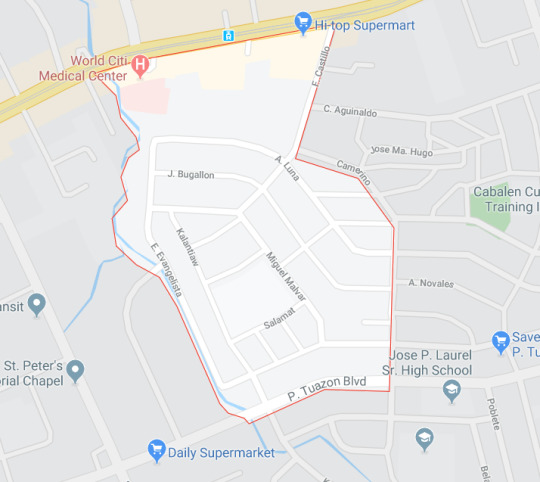
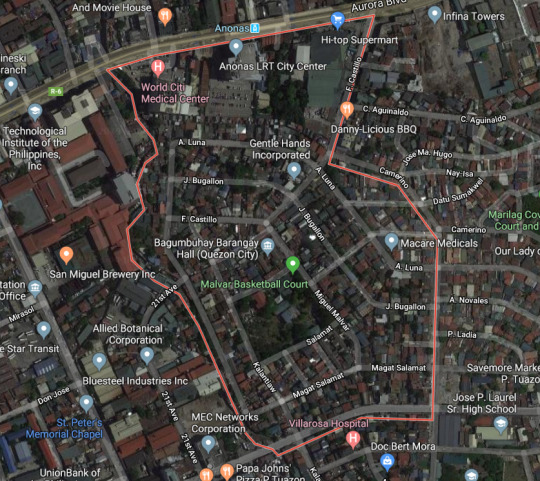
Barangay Bagumbuhay’s hall is right along the residential area of Miguel Malvar Street. Easily accessible by the Light Railway Transit (LRT) System (though it is currently closed for operations) or by jeeps coming from Cubao or Katipunan, going through Aurora boulevard.
Due to the location of the barangay, not a lot of natural hazards were identified. According to PHILVOC’s faultfinder, the barangay is approximately 1.6 km. from the nearest active fault trace, which is the West Valley Fault.
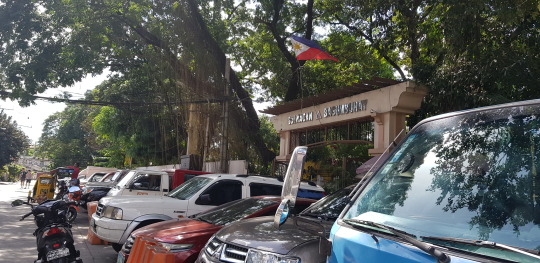

The barangay also had an advantage of being located right on top of a hill-like landmass, giving it the ability to rule out severe cases of flooding. However, there were still hazards to the community that were present. Namely, Anthropogenic hazards which were the structures and residential areas that were violating building code. Particularly the residential areas that were built atop the creek along F. Castillo Street. The officials fear that if these structures weren’t fixed immediately, they may become a danger to the residents should an offshoot of a disaster happened (e.g. fires). Blocked roads and alleys were also a danger since they served as a blockage to the entry and exit of residents to and from their homes, making it difficult for them to move through.
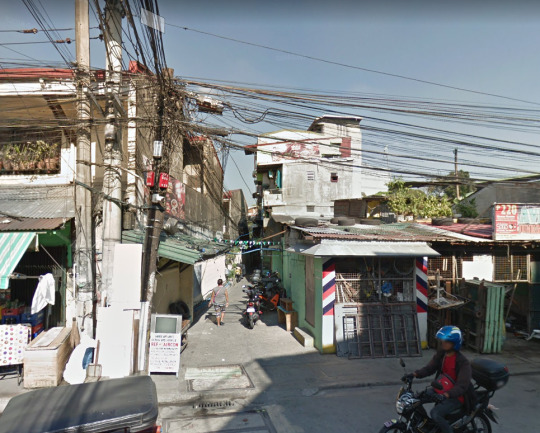
The officer in charge of the Disaster Risk Reduction and Management office of barangay Bagumbuhay, Estiño Martinez, introduced me to the various DRRM plans they had prepared in case the community faced a disaster. There were plans of evacuation locations for the nearby residents as well of those people who need special care and attention. Sr. Martinez provided a list of projects that had already been done and to be done (for 2020) in order to fulfill their duty of reducing the risk of any hazards that pose a threat to the community.
Sr. Martinez accompanied us in viewing the various preparations the had in store. For medical emergencies, for fire accidents, as well as for the aftermath of any disaster.
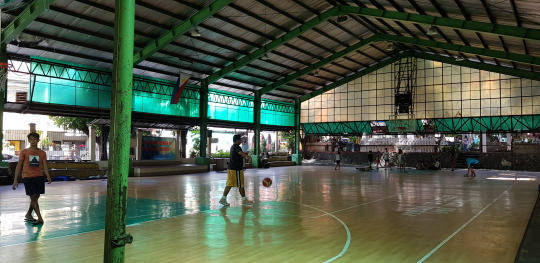
The multipurpose court to be used as an evacuation center for the community.

A funeral parlor and holding area for the families who are cannot afford the expenses of having a proper burial for their family member.
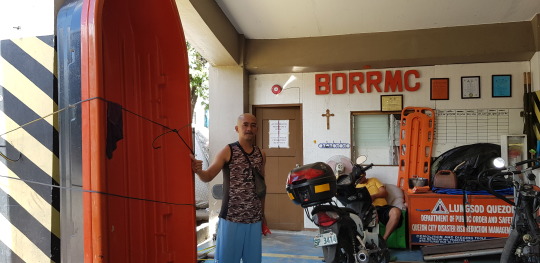
A Barangay Disaster Risk Reduction and Management Center right behind the hall. This includes the various materials and equipment to be used if in case of an emergency.

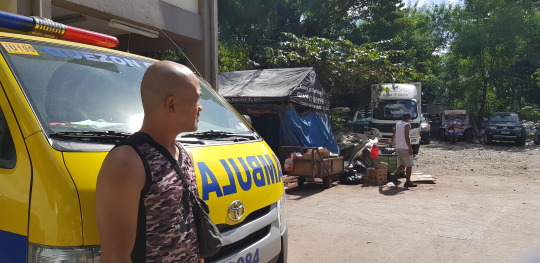
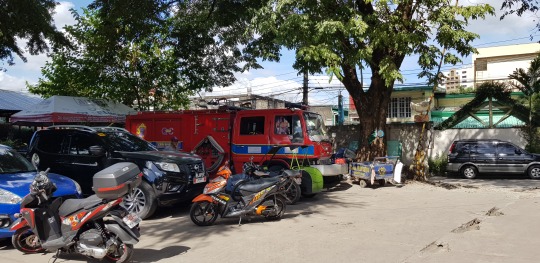
The fully-equipped ambulance and fire truck on stand-by 24-7. Sir. Martinez also informed us that the people manning these vehicles were always on site. He told us that they had shiftings in place for these positions as to prevent lacking important personnel if and when needed.
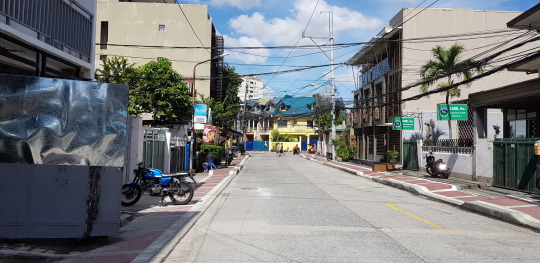
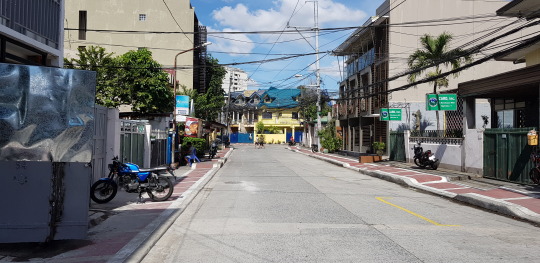
The barangay council also set forth a clearing operation for the entire Miguel Malvar Street. This was to prevent blockage or traffic for the emergency vehicles going in and out of the barangay hall area.
When I asked about the issues that the barangay faced in implementing their plans, he told us how sometimes there were residents who refused to take part in an operation they called Ugnayan. This system allowed residents to be informed of the basic and immediate reparations should a disaster ever happen. Seminars and workshops going on in the barangay is also openly given and provided to the residents. Sr. Martinez explained to us how participation of all the individual members of the community is what will ultimately help the community, not just the barangay personnel. The interview was then abruptly cut due to the schedules Sir. Martinez had.
Though our time was short, he was able to answer all my questions and expound on his answers in a concise manner. I am extremely grateful to Sir Martinez for giving me his time in answering all my questions.

The interview led me to many conclusions about how vital it is for a community to be prepared for such disasters. In case of any disaster or emergency, before any government relief & support reaches or outside help is utilized, it is the Community which has to respond immediately (at the hour). As the Community plays the role of First Responder, it is critical that there is adequate awareness and preparedness at the Community level especially among the most vulnerable set of communities residing in the most vulnerable areas.
Disaster preparedness provides a platform to organize effective, realistic and coordinated planning, reduces the waste of efforts and increase the overall effectiveness of the individual, household and community members disaster preparedness and response efforts. Disaster preparedness activities that are planned with risk reduction measures can prevent disaster situations and also result in saving maximum lives and livelihoods during any disaster situation, enabling the affected community to easily get back on its feet within a short period of time. Community preparedness can be thought of as the advance capacity of a community to respond to the consequences of an adverse event by having plans in place so that people know what to do and where to go if a warning is issued or a hazard is observed.
What we plan with our families, our community, and in our country helps us consider our emergency response activities in light of existing and new disaster risks that is affecting us and our country. This allows us to design or adjust our activities so that people and communities and in the end, our country to become safer and more disaster-resilient, as well as safeguarding efforts to create and expand enabling conditions for sustainable poverty alleviation and development. This can help strengthen our communities and reduce our vulnerability to the multiple natural disasters heading our way.
The best way we can do to help our community and our country is to raise awareness. People being informed and equipped with the right knowledge will go a very long way. Just as the saying goes, it is better to know it and not need it than to need it and not know it.
We as a community must urge our those we have elected to government positions to quickly move in planning and developing projects that will protect the public. We must build resilience in ourselves and also in the systems of our society. We must approach climate change with fear, for what our children’s future will be, and courage and hope, that we can heal what has been done.
To our public officials, they must create and support national policies and strategies allocating the resources of the country to manage the risk threatening it. Everyone must help in pushing for change and improvement in access to quality primary health care even before disaster strikes.
To our workforce, we must be trained and equipped in planning for all types of emergencies. We need to be able to identify hazards, vulnerabilities, and our own capacities to lessen risks.
To the public, we as collective need to promote risk awareness of emergencies as well as providing health education to the youth. There is so much we can do when we join together for a cause that will protect us and our families.
True “resilience”, I believe, is not tolerance or ignorance of the system that is broken in the front of adversity. It is the triumphant improvement of ourselves, physically and socially to become better. A better Filipino nation that faces calamities not in a defeatist manner but with a strength of Filipinos coming together.
#text#text post#nstp#literary training service#barangay#disaster risk reduction and management#drrm#philippines#blog post
6 notes
·
View notes
Text
WRIT OF PROHIBITION
ARTICLE 31 OF THE FAMILY CODE
LT. (SG) EUGENE GONZALES, LT. (SG) ANDY TORRATO, LT. (SG) ANTONIO TRILLANES IV, CPT. GARY ALEJANO, LT. (SG) JAMES LAYUG, CPT. GERARDO GAMBALA, CPT. NICANOR FAELDON, LT. (SG) MANUEL CABOCHAN, ENS. ARMAND PONTEJOS, LT. (JG) ARTURO PASCUA, and 1LT. JONNEL SANGGALANG, Petitioners,
v. GEN. NARCISO ABAYA, in his capacity as Chief of Staff of the Armed Forces of the Philippines, and B. GEN. MARIANO M. SARMIENTO, JR., in his capacity as the Judge Advocate General of the Judge Advocate General's Office (JAGO), Respondents.
[G.R. NO. 164007 : August 10, 2006]
FACTS:
On July 26, 2003, President Gloria Macapagal Arroyo received intelligence reports that some members of the AFP, with high-powered weapons, had abandoned their designated places of assignment. Their aim was to destabilize the government. The President then directed the AFP and the Philippine National Police (PNP) to track and arrest them.
On July 27, 2003 at around 1:00 a.m., more than 300 heavily armed junior officers and enlisted men of the AFP - mostly from the elite units of the Army's Scout Rangers and the Navy's Special Warfare Group - entered the premises of the Oakwood Premier Luxury Apartments on Ayala Avenue, Makati City. They disarmed the security guards and planted explosive devices around the building.
In order to avoid a bloody confrontation, the government sent negotiators to dialogue with the soldiers. The aim was to persuade them to peacefully return to the fold of the law. After several hours of negotiation, the government panel succeeded in convincing them to lay down their arms and defuse the explosives placed around the premises of the Oakwood Apartments. Eventually, they returned to their barracks.
The Solicitor General, representing the respondents, counters that R.A. No. 7055 specifies which offenses covered by the Articles of War are service-connected. These are violations of Articles 54 to 70, 72 to 92, and 95 to 97. The law provides that violations of these Articles are properly cognizable by the court martial. As the charge against petitioners is violation of Article 96 which, under R.A. No. 7055 is a service-connected offense, then it falls under the jurisdiction of the court martial.
Issue:
Whether or not the petitioners are entitled to the writ of prohibition
Ruling:
In imposing the penalty for such crimes or offenses, the court-martial may take into consideration the penalty prescribed therefor in the Revised Penal Code, other special laws, or local government ordinances.
Section 1 of R.A. No. 7055, quoted above, is clear and unambiguous. First, it lays down the general rule that members of the AFP and other persons subject to military law, including members of the Citizens Armed Forces Geographical Units, who commit crimes or offenses penalized under the Revised Penal Code (like coup d etat), other special penal laws, or local ordinances shall be tried by the proper civil court. Next, it provides the exception to the general rule, i.e., where the civil court, before arraignment, has determined the offense to be service-connected, then the offending soldier shall be tried by a court martial. Lastly, the law states an exception to the exception, i.e., where the President of the Philippines, in the interest of justice, directs before arraignment that any such crimes or offenses be tried by the proper civil court.
0 notes
Text
Sabalones v. Court of Appeals
G.R. No. 106169
February 14, 1994
Facts:
Samson Sabalones was married to Remedios Gaviola-Sabalones, who managed the couple’s properties while the former was away at work. In 1981, Samson contracted a bigamous marriage with Thelma Cumareng. In 1985, upon his retirement, Samson came back to the Philippines and stayed with Cumareng. Four years later, he filed an action for judicial authorization to sell a building and lot belonging to the conjugal partnership with Remedios. He claimed that he was 68 years old and sick and needed the proceeds of the sale for his hospitalization and medical treatment.
Remedios opposed the authorization and filed a counterclaim for legal separation. She alleged that the property her husband was trying to sell was being occupied by her and their six children and that they were depending for support on the rentals from another conjugal property. The court decreed the legal separation and declared the forfeiture of Samson’s share in the conjugal properties. The court further ordered that he was not entitled to support by his wife.
While the decision was on appeal, Remedios filed a motion for the issuance of a writ of preliminary injunction to enjoin Samson from interfering with the administration of their properties. She further stated that her husband threatened their tenant that the contract would not be renewed. The writ was granted by the Court of Appeals.
Issue:
Was the Court of Appeals correct in granting the writ of preliminary injunction?
Ruling:
Yes. Article 61 of the Family Code states that after a petition for legal separation, the trial court shall appoint either one of the spouses or a third person to be the administrator of the conjugal properties if there was no written agreement between the spouses. Although there was no formal declaration by the trial court, it was implicitly provided in the decision that the administration would go to the wife since the court denied the husband any share in the conjugal properties.
The primary purpose of the injunction is to preserve the status quo of the things subject of the action or relations between the parties. The requirements for injunction are the existence of a right and its actual or threatened violation, which was both present in the case.
0 notes
Photo

READ: https://www.ianfulgar.com/architecture/national-building-code-of-the-philippines-its-history-current-state-and-future/ The upcoming House Bill 5607 is an act strengthening Presidential Decree No. 1096, The National Building Code of the Philippines with penalties for violators. #philippines #construction #architect #architecture #architecturedesign #architects #architecturestudent #architectures #modernarchitecture #newconstruction #constructionlife #architectureschool #architectureanddesign #architectdesign #architectureinlife #buildingcode #code #nbc
#philippines#construction#architect#architecture#architecturedesign#architects#architecturestudent#architectures#modernarchitecture#newconstruction#constructionlife#architectureschool#architectureanddesign#architectdesign#architectureinlife#buildingcode#code#nbc
0 notes
Text

Binay Dynasty
The Binay Dynasty is known for urbanizing the city of Makati. It all started with Jejomar Binay, the father of the Binays. Jejomar Binay was born on November 11, 1942, he was a Filipino born into poverty at a young age. While he was growing, he was being bullied for his skin color, calling him ‘nognog’, and he was also insulted for his height, calling him ‘pandak’. These insults didn’t stop him from studying and working hard. He graduated in UP Diliman with a Political Science Degree in 1962. During Marcos’ reign, Binay and other human rights lawyers created the Movement of Attorneys for Brotherhood, Integrity, and Nationalism, Inc. (MABINI). His efforts were recognized by Cory Aquino, the president of the Philippines at that time, and appointed Binay as a local official for Makati when the mayor, Nemesio Yabut, died during the EDSA Revolution. Jejomar Binay was elected mayor of Makati on January 18, 1988, and urbanized the city during his reign, while also providing free social education and medical services. He continued being mayor until 1998, when his wife, Elenita Binay, took over. He became mayor again in 2001 until 2010, where his children will eventually take over. While he was mayor for Makati, there were also a lot of illegalities that happened.
In October, 2006, the Department of the Interior and Local Government (DILG) issued a suspense order against Jejomar Binay. Binay, along with other people, barricaded themselves in the Makati City Hall, because they didn’t want to cooperate. He then issued an injunction order to prevent the office of the president from enforcing the suspension order until the conflict was resolved. He allegedly purchased P232 million worth of office furnitures and infrastructure from 1991-2006, which the Bureau of Internal Revenue (BIR) eventually froze the bank accounts of the mayors and city government. The whole city owed P1.1 billion worth of taxes. The Court of Tax Appeals (CTA) then issued Binay to pay deficiencies in taxes of more than P1.1 billion. After all the conflicts and alleged corruption he had, he decided to run for president in the 2010 elections. This was his original plan, but instead campaigned for vice presidency, along with Erap Estrada for president. Erap Estrada didn’t win the elections for presidency, but Jejomar Binay won for vice president, who he would assist Benigno Aquino III, who was the president at that time. With Erap, during the elections, he was under the Partido Demokratiko Pilipino-Lakas ng Bayan, which is a social-democratic-federalist political party. Binay took his oath for vice presidency on June 30, 2010. He was given to be the Chairman of the Housing Urban Development Coordinating Council, and the Head of Task Force for Overseas Filipino Workers.
Elenita Binay or Elenita "Ellen" Sombillo Binay, M.D., was born on November 9, 1944. She graduated from Manila Central University College of Medicine with a medical degree. She worked as a resident physician and OB-GYN at José R. Reyes Memorial Medical Center, where she would eventually meet her now-husband, Jejomar Binay. They got married in July 1972. She then became the first female Mayor of Makati leading the city from 1998-2001. Like her husband, she was charged with alleged graft purchases of office furnitures and infrastructures.
Nancy Binay or Maria Lourdes Nancy Sombillo Binay-Angeles, was born on May 12, 1973. She originally studied for culinary arts but got a Science Degree in Tourism in 1997 from UP Diliman. She helped her mother, Elenita, in the office when she became mayor, and also assisted her father when he became the vice president of the Philippines. Because of the opportunities and her potential, she ran and won for senate in the 16th congress, and continued in the 17th congress. She was part of the United Nationalist Alliance party. In her senate, she filed 119 bills and 151 resolutions that advocated for the children, the elderly, infrastructures, and the poor. Some of those bills were ‘An Act Repealing the Crime of Premature Marriage under Article 251 of the Revised Penal Code’, ‘Sugarcane Industry Development Act of 2015’, ‘An Act Expanding the Benefits and Privileges of Persons with Disability’, and more. During her 17th congress, she supported the SOGIE Bill, which helps against discrimination, Free Higher Education Law, and the Tax Reform for Acceleration and Inclusion Act.
Abigail Binay or Mar-len Abigail "Abby" Sombillo Binay-Campos, was born on December 12, 1975. She graduated in UP Los Baños with a bachelor's degree in human ecology, and after, went to Ateneo for law school. She was elected representative of Makati's 2nd District in 2007 and eventually became the mayor for Makati and took oath on June 27, 2016. She co-authored bills like ‘The Reproductive Health Bill’, ‘Centenarians Act of 2016’, and ‘Expanded Maternity Leave Law of 2017’. She was also part of MABINI, which her father and other human rights lawyers created.
Junjun Binay or Jejomar Erwin "Junjun" Sombillo Binay Jr., was born on July 12, 1977. He graduated from UP Diliman with a bachelor's degree in Philippine Studies Major. He got married with his wife, Kennely Ann Lacia, but she sadly passed away in 2009 while in childbirth with their fourth child. When he was a counselor, he was Chairman of the Committee of Rules, Legal Matters and Ethics, Committee on Education, Arts and Sciences, and was also part of other committees. He then ran for mayor for Makati in 2010 and won. He continued his reign as mayor and won in the 2013 local elections. He was filed for graft and falsification of documents that’s also connected with the construction of the Makati City Hall Building. He was also found guilty for dishonesty, grave misconduct, and conduct prejudicial. He was politically suspended for these reasons. He still ran for mayor in 2016, but lost against his sister, Abigail Binay.
Jejomar Binay has two other children which are Marita Angeline Binay-Alcantara and the youngest, Joanna Marie Blanca Binay, but there isn't any information retrieved about them.
The more you would learn about the Binay’s, the more you’ll realize that they are corrupt. The family would face numerous issues that negatively impact our country. Some of their issues would be the Sandiganbayan Graft Case, and the Binay’s Family Feuds. In the Sandiganbayan Graft Case, this would have Elenita Binay, who was Makati’s mayor at the time, plunder funds at least P72.06 million worth of furniture for the Makati City Hall back in 1999, through the means of a sham bidding. Ernesto Aspillaga, in charge of the bidding, would mention how bidding procedures weren’t followed. He would find out the winning bidder had already decided before the bidding took place, plus dummy companies and documents to make it appear a bidding really occurred. Elenita Binay would be dismissed, the reason would be stated in an article where “In a resolution last June 10, the Fifth Division said it granted Binay’s demurrer to evidence because the prosecution failed to prove that she violated Section 3(e) of the Anti Graft and Corrupt Practices by authorizing the purchase of furniture worth P72.06 million.”
It doesn’t just end there as Family Feuds are also a usual occurrence. It would start small where Nancy Binay would accuse Abby Binay’s husband, Luis Campos, the representative of Makati, of being related to the Narcotics trade. That accusation would cause a big dispute between the two siblings, causing bitter feelings towards each other. This would contribute to a bigger family feud involving Junjun Binay and Abby Binay. Abby Binay would run against Junjun Binay for mayor in 2019. Junjun Binay would go through an interview and would mention how Abby Binay is running against him as “vengeance”. He would say ,“Yung mga Facebook post niya na pinapakita sa akin, sinasabi niya forgiveness will not come anytime soon. I think she’s being driven by vengeance.” Their father, Jejomar Binay allowed them to go against each other, provided that they avoided throwing insults at each other. Nancy Binay would side with Junjun Binay saying that her relationship with Abby Binay was already strained before. She would say ,“Ah basta ako, magkakapamilya pa rin kami eh di ba? Magkakadugo kami, so dapat ‘yong hope na magkakaayos kami should always be there.” The way they would actually treat each other during the race to become Makati Mayor would be aggressive. Abby would say that Junjun would spread lots of lies regarding her husband. They would both get into a heated argument due to Abby’s allegations, and they would be screaming and pointing at each other, alongside Junjun doing a condescending bow. The argument got so heated that Jejomar Binay, their father, would try to stop them. Once reelections came, Abby would win the Mayoral race.
Conclusion - Reflections
Daenah Deguito
We know that the Binay Family is a political dynasty, having ruled Manila's Makati financial district for nearly three decades, starting with former Vice President Jejomar Binay, to his wife, then his children. He has gained large followers among the urban poor and the masses who are the recipients of patronage goods from Filipino politicians. Promising that the conditions of the Filipinos should be lifted, he mainly uses the capacity of his stronghold Makati. The Binay Family was able to help thousands of people, but they were implicated in many corruption scandals. Binay denies it, saying that his resources were primarily from the pig business he began in 1994 and from the properties he owned before he was elected mayor of Makati. He brags that Makati takes care of its residents from support to grave, offering free hospitalization, training, education and the government assistance of senior citizens. As a politician, he cultivated ties with the common people, which gained their trust in him. In conclusion the Binay family history is an important part of our history due to the contributions and negative impact they had on our country.
Roberto Layug
The Binay Dynasty resembles that of a classic underdog story as Jejomar Binay himself was of low status and appearance. He had been devalued due to his looks and lineage in his younger years, but it was this experience that established a connection between him, and the unban and lower class populous as his story had experiences shared by many that wanted him to succeed. With this connection established, he had made it clear that he would want to uplift the common filipino by investing more into infrastructure, and bills that would aid those less fortunate such as providing more education, hospitalization, and assistance for the elderly. However as he would grow in power he would start to invest more into himself, although it is not confirmed he was accused of buying assets such as a piggery with air-conditioning and hotel-like accommodation in his office defying enabling laws as said by the Philippine constitution. Overall he has established himself as an important foothold in our country’s history and stands as an example of a Power of the People mentality for a city as well as what temping lavishness can do to someone in power.
The Binay’s are one of the well-known political dynasties in the Philippines. They are also known to be the political family that urbanized the city of Makati, which until now, they’re watching over. Though they have contributed a lot politically, like the urbanizing of Makati city, and contributed with laws like ‘An Act Expanding the Benefits and Privileges of Persons with Disability’, the SOGIE Anti-Discrimnation Bill, ‘Expanded Maternity Leave Law of 2017’, and more, they were exposed with the corruption they brought. They were exposed with the graft and falsification cases they had, which was equivalent to more than a billion pesos. This resulted in Junjun Binay to have a political suspension. Nancy Binay and Abigail Binay would have a family feud due to a call-out on associating with a narcotics trade. Abigail Binay and Junjun Binay went against each other for mayor of Makati. Them being a political dynasty is even breaking the supposed law as political dynasties aren’t allowed, stated in the Philippine Constitution of 1987. Even though there is a constitution about political dynasties, there are multiple of these in the Philippines. It is stated in the Philippine Constitution that political dynasties aren’t allowed, yet there aren’t any laws that support this. Senator Miriam Defensor presented an Anti-Political Dynasty Bill that would essentially wipe out the political dynasties in the Philippines, but it isn’t being approved. If and when this bill becomes a law, the political dynasties would be prohibited and would have to ‘break-up’ or be disqualified in the government. In conclusion, the Binay Dynasty represents and improved Makati City, but they have a fair share of corruption which selfishly gains their family some benefits. They are a family full of secrets and dishonesty towards their people, which makes them one of the most controversial and problematic dynasties in the Philippines.
Diane Panganiban
There have been numerous political family dynasties that happened in the Philippines which would almost always end up in Corruption. The Binay’s have had their fair share of projects and campaigns that would benefit the Philippines, but this doesn’t mean they were always great. Looking deeper into the Binay’s, they are actually very corrupt. Issues the Binay’s would be involved in were the Sandiganbayan Graft Case, Political Suspensions, Family Feuds and other issues speculating around them. Sandiganbayan Graft Case, where they would plunder funds worth at least P72.06 million through the means of a sham bidding; Political Suspensions, where Junjun would show dishonesty, wrong conduct and falsification of documents leading to his suspension; and Family Feuds, where Nancy would have a disrupt against Abby as she would falsely accuse her husband for being related in the Narcotics Trade or when Abby would run against Junjun for Mayor. These issues would be denied by the family, convincing the public that they are there to put their family in a bad light. To add up to this, Even though the public were aware of these issues, Jejomar Binay still ended up as the 13th Vice President of the Philippines. These aren’t the only issues surrounding the Binay’s, there are more out there and some may even be hidden from the public. It’s enough to show us that they’re a corrupt political dynasty, but of course, there would be achievements that helped us Filipinos. An example of these achievements would be some bills the Binay’s would sponsor like the Reproductive Health Bill, Centenarians Act of 2016, Expanded Maternity Leave Law of 2017, the SOGIE Anti-Discrimination Bill and other bills that are passed or are eventually going to be passed as a law. At the end of the day, regardless of their achievements, they’re still corrupt, and this corruption could affect the country, all of us, negatively. As of now, there’s a bill called the Anti-Political Dynasty Bill passed down from constitution to constitution. It hasn’t been made as a law yet which allows dynasties like the Binay’s to continue. Hopefully in the future, this bill could finally be passed down as a law and prevent Corruption that involves Political Dynasties in the Philippines. To conclude, Political Dynasties negatively impact our country and allow corruption to stem from a political family.
0 notes
Photo

Ayon sa Section 301 Building Permits ng National Building Code of the Philippines "A building permit shall not be required for the following minor constructions and repairs, provided these shall not violate any provision of the Code and this IRR. - - - a. Minor Constructions i. Sheds, outhouses, greenhouses, children’s playhouses, aviaries, poultry houses and the like, not exceeding 6.00 sq. meters in total area, provided they are completely detached from any other building and are intended only for the private use of the owner. ii. Addition of open terraces or patios resting directly on the ground, not exceeding 20.00 sq. meters in total floor area, exclusively for the private use of the owner. iii. Installation of window grilles. iv. Garden pools for the habitation of water plants and/or aquarium fish not exceeding 500 millimeters in depth and exclusively for private use. v. Garden masonry walls other than party walls not exceeding 1.20 meters in height, footpaths, residential garden walks and/or driveways. - - - b. Repair Works i. Repair works not affecting or involving any structural member, such as replacement of deteriorated roofing sheets or tiles, gutters, downspouts, fascias, ceilings and/or sidings. ii. Repair and/or replacement of non load-bearing partition walls. iii. Repair and/or replacement of any interior portion or a house not involving addition or alteration. iv. Repair and/or replacement work of doors and windows. v. Repair and/or replacement work of flooring. vi. Repair of perimeter fence and walls. vii. Repair and/or replacement of plumbing fixtures, fittings or pipings, such as toilet bowls, sinks, lavatories, urinals, bidets, pipes, faucets, valves for single detached dwellings and duplexes. Lamang ang may alam! :) LIKE THESE PAGES FOR MORE UPDATES! - https://www.facebook.com/engineerges https://www.facebook.com/zekastructs - #civilengineer #architect #pabahay #mechanicalengineer #electricalengineer #masterplumber #sanitaryengineer #masterelectrician #construction #dreamhouse #modernhousedesign #houseconstruction #designandconstruction #sulit #priceandquality #pabahay #houseandlot #buildingpermit #engineeringtips #professional #national https://www.instagram.com/p/CLDr7LLhp5I/?igshid=1b4xtoo5ldc6u
#civilengineer#architect#pabahay#mechanicalengineer#electricalengineer#masterplumber#sanitaryengineer#masterelectrician#construction#dreamhouse#modernhousedesign#houseconstruction#designandconstruction#sulit#priceandquality#houseandlot#buildingpermit#engineeringtips#professional#national
0 notes